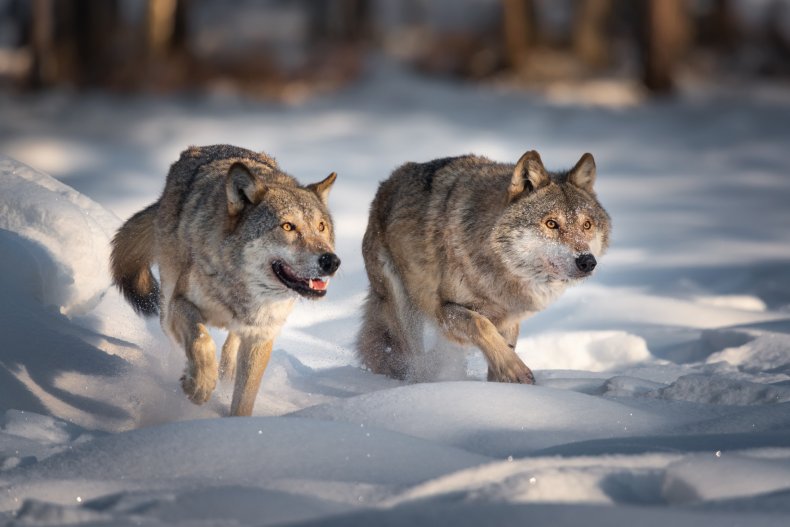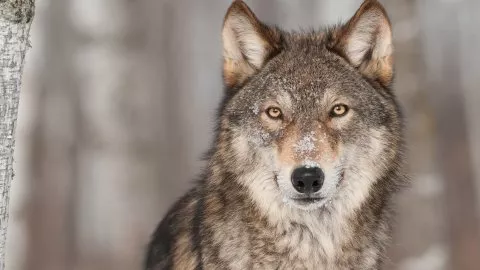BY JESS THOMSON ON 8/26/22
Wolves that had nearly completely disappeared from Michigan's Isle Royale have doubled in population since 2020.
According to researchers studying the natural populations on the island, there are now an estimated 28 wolves living on Isle Royale.
This comes after efforts to increase the wolf populations in the area via trapping and relocating wolves to the Isle Royale from Minnesota, Canada and Michigan's mainland Upper Peninsula. In 2018, there were only two wolves left alive on the island.
"Each time we carried out aerial surveys this winter, we saw wolf tracks across many parts of the island and we also regularly saw groups of wolves traveling or resting together," Sarah Hoy, a Michigan Technological University researcher who was one of the leads in the 63rd annual Winter Study, told MLive.
"It is such a pleasant change from five years ago when there were only two wolves on the island and the future of the wolf population looked pretty bleak. It just goes to show how quickly wolf populations are able to thrive in places where they are free from persecution."

The population of wolves on Michigan's Isle Royale has doubled to 28 individuals in recent years.
ISTOCK / GETTY IMAGES PLUS
Gray wolves, which can grow to lengths of up to 6 feet and weights of up to 110 lbs, were once the apex predator on Isle Royale, a large island in Lake Superior close to the Michigan state border with Canada. Wolves arrived on Isle Royale from the Canadian mainland via an ice bridge during the winter of 1948, reaching a top population of around 50 individuals in 1980.
The reasons that the wolves populations have declined so significantly in recent years is likely due to lack of availability of their main food source: older moose and calves. It is also thought that the wolves have been affected by the spread of canine diseases to the island.
Due to the small populations, the wolves are genetically inbred, which has led to further disadvantages, including spinal and rib deformities.
The reason for the population restoration efforts is that as apex predators in the island food chain, the wolves are crucial for controlling prey populations. If left unchecked, the wolves on the island may have gone completely extinct, which would have caused an explosion in their prey species, including moose and beavers. This would have unbalanced the island ecosystem, potentially leading to more species extinctions in the region, especially in native plant species consumed by the moose.
Gray wolves, which can grow to lengths of up to 6 feet and weights of up to 110 lbs, were once the apex predator on Isle Royale, a large island in Lake Superior close to the Michigan state border with Canada. Wolves arrived on Isle Royale from the Canadian mainland via an ice bridge during the winter of 1948, reaching a top population of around 50 individuals in 1980.
The reasons that the wolves populations have declined so significantly in recent years is likely due to lack of availability of their main food source: older moose and calves. It is also thought that the wolves have been affected by the spread of canine diseases to the island.
Due to the small populations, the wolves are genetically inbred, which has led to further disadvantages, including spinal and rib deformities.
The reason for the population restoration efforts is that as apex predators in the island food chain, the wolves are crucial for controlling prey populations. If left unchecked, the wolves on the island may have gone completely extinct, which would have caused an explosion in their prey species, including moose and beavers. This would have unbalanced the island ecosystem, potentially leading to more species extinctions in the region, especially in native plant species consumed by the moose.
Between 20-30 wolves were planned to be reintroduced onto the island in 2018. However, according to MLive, tracking the wolves has faced difficulties, as their GPS tracking collars break over time, or are somehow removed. This has meant that not all the wolves thought to be on the island are now accounted for.
Of the wolves that were trapped and relocated to Isle Royale between October 2018 and September 2019, one is known to have left via an ice bridge, nine have died, and only three are confirmed alive as of March 2022. The statuses of the remaining seven are unknown, however, the population of moose continues to decrease, declining by 28 percent since 2020.

No comments:
Post a Comment